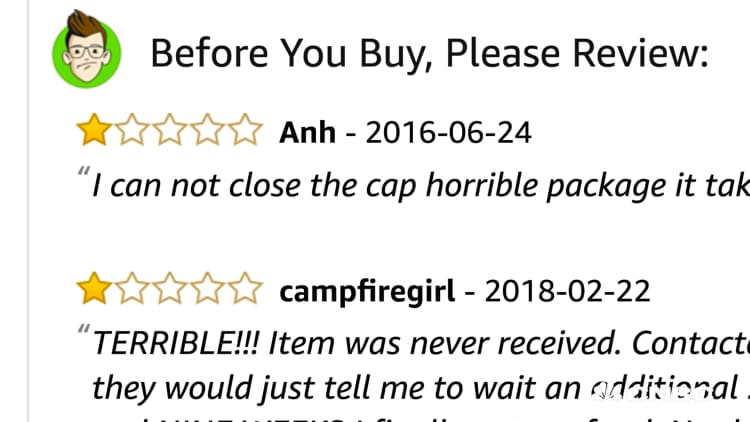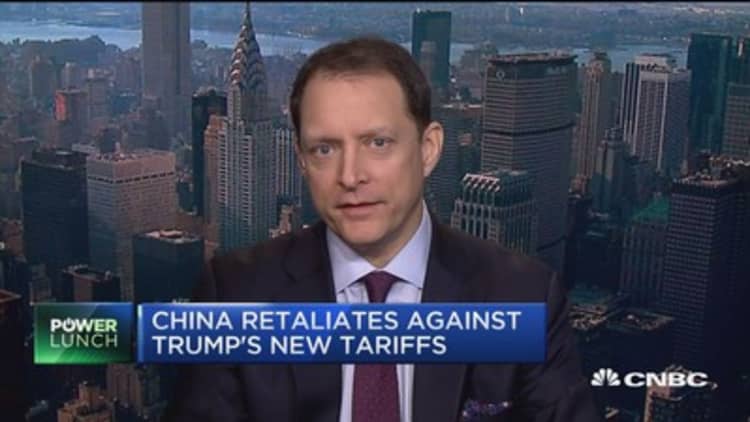Amazon upended the book industry more than two decades ago by bringing sales onto the web. Now, during the heart of the holiday shopping season, the company is wreaking havoc on used booksellers who have come to rely on Amazon for customers.
In the past two weeks, Amazon has suspended at least 20 used book merchants for allegedly selling one or more counterfeit textbooks. They all received the same generic email from Amazon informing them that their account had been "temporarily deactivated" and reminding them that "the sale of counterfeit products on Amazon is strictly prohibited."
Booksellers are among the millions of Amazon's third-party sellers, a segment that's now responsible for over half of the company's e-commerce volume. The fees Amazon charges those sellers for shipping, fulfillment and other services accounted for over $10 billion of revenue in the third quarter, or 18 percent of Amazon's total sales.
The crackdown on textbook sellers stands out at a time when Amazon is dramatically stepping up its broader anti-counterfeiting efforts, suspending third-party sellers across all its popular categories. Unlike most suspensions, which tend to occur after complaints from consumers or from brand owners who are monitoring the site for counterfeits, these booksellers got caught up a coordinated sting operation run by Amazon.
The mysterious Clara Dufour
According to three sellers who spoke to CNBC, as well as numerous messages on public forums, many of the supposedly counterfeit books had been sent to the same person and address.
When these sellers got the email from Amazon notifying them that their accounts had been suspended, they checked their records and found that the book had been sent to Clara Dufour at 303 S. River Street in Seattle.
If Dufour really exists, she doesn't seem to work or live at that address, which is home to a 75,000 square foot commercial office space called OpenSquare. A representative at the OpenSquare location said he'd never heard of Dufour, knew nothing of any books arriving there and suggested checking with the "Amazon fulfillment center across the street."
An administrator at the nearby Amazon warehouse said it was company policy not to disclose the name of any employees at the facility.
Meanwhile, the booksellers have been busy filling out appeals for reinstatement and trying to get someone at Amazon to listen. Several of them have had their accounts reactivated this week, but without explanation.
At the same time, they're trying to figure out who's behind Clara Dufour, and have congregated on an Amazon Sellers Forum that's accumulated 376 comments since the first seller posted about the issue on Nov. 30.
In a statement after the story was first published, an Amazon spokesperson acknowledged that the company was behind the sting.
"Our customers expect authentic product and we have zero tolerance for counterfeits in our store," Amazon said. "These counterfeit books were caught in a test buy program we operate, which is just one component of our aggressive anti-counterfeiting efforts. The publishers for these books confirmed that these particular books were counterfeit so we took swift action to protect our customers."

To be sure, the textbook industry has been hurt by counterfeiting. Textbooks in the U.S. generate $10 billion to $12 billion a year for the publishers. The industry already has to contend with the used and rental book markets, which drag down sales of new books. Publishers say the increase in counterfeits is making the economic model that much harder — in February 2017, publisher Cengage attributed a 17 percent decline sales decline in its learning division in part to "a significant increase in the availability of counterfeit print books in the markets."
As a result, textbook publishers are aggressively pursuing counterfeiters in many venues. In August, for instance, a consortium of the top five publishers called EPEG (the Educational Publishers Enforcement Group) was awarded $34 million in a trademark and copyright infringement suit against a group of Ohio-based companies.
But even people close to the publishers aren't able to explain exactly what's happening on Amazon.
Matt Oppenheim, an attorney at Oppenheim + Zebrak, represents EPEG and has been working on behalf of the book industry for almost 10 years to stamp out counterfeits through suing problem sellers and through the website stopcounterfeittextbooks.com.
Oppenheim, who's based in Washington, D.C., has teamed up with Amazon in recent years to try to get fakes off the site. He said this is the first time he's heard the name Clara Dufour or anything about the River Street address in Seattle.
But Oppenheim told CNBC that the publishers have given Amazon the flexibility to take the action it deems appropriate.
"The publishers are actively attempting to identify and address counterfeit sellers on Amazon and other marketplaces," he said. "They're doing that both on their own and are encouraging Amazon to take affirmative and aggressive steps to monitor its marketplace."
Who's getting suspended
Amazon's counterfeit quandary dates back several years to when the company opened its marketplace doors to Chinese sellers. It's gotten so bad that in October, the American Apparel & Footwear Association recommended that certain Amazon sites across the globe be added to the U.S. government's annual "Notorious Markets" list, which identifies commerce sites and companies that facilitate the sale of counterfeit goods. Amazon reiterated at the time that it has "zero tolerance" for counterfeit sales and has developed technology to try to identify abusive sellers and storefronts.
But as Amazon cracks down on the problem, some small sellers are being caught as collateral damage.
For instance, one textbook seller swept up in the effort was Books4Cause, a small company in Skokie, Illinois, that collects donated books and provides them in bulk, primarily to libraries and schools in Africa and underserved populations around Chicago.
Yosef Lifchitz, who founded Books4Cause in 2007, said that of the 20,000 to 40,000 books his business acquires every year, about 10 percent get sold on Amazon to fund the operation of storing books and shipping to Africa. Lifchitz said the revenue he brings in pays for his budget, which amounts to $200,000 to $250,000 a year, and leaves just enough income for him to take care of his five kids.
On Nov. 30, Lifchitz received the same email as the other booksellers, telling him his "Amazon Seller account has been temporarily deactivated," his "listings have been removed" and funds will be held in his account "while we work with you to address the following issue."
Amazon wrote that it has "concerns about the authenticity of the item(s) listed at the end of this email," and provided an identification code at the bottom. The code pointed to a college physics textbook published by a Cengage imprint over a decade ago. Lifchitz said he picked up the item in a book drive at Penn State University, sold it for $8 on Amazon and shipped it to Clara Dufour.
"To think I would risk my whole business on copyright[ed] books that we sold for $8 is preposterous," he said.
Lifchitz said he does a thorough review of books before selling them, and he estimated that perhaps one in every 10,000 books he puts on the market is counterfeit and slips through the cracks.
"People that are doing counterfeits are doing that at a large scale with big operations," he said. "They'll be creating multiple Amazon accounts and doing other shady stuff, which we're not."
Amazon reinstated Lifchitz on Tuesday, soon after CNBC reached out to the company about his case. He lost 11 days of sales and was given no apology or guidance for the future. His reinstatement came after multiple Amazon representatives told him by phone that his case was being passed along to the seller performance team and to the group that handles fraud detection.

Another seller, who asked not to be named, sells about 2,000 items on Amazon, including household goods, toys and some books that she buys from Goodwill and thrift stores.
In September, she sent a book to Clara Dufour in Seattle. About 40 days later, there was a return request because the customer indicated that she "bought it by mistake," the seller said. Then on Nov. 30, she got the same email that Lifchitz and others received, suspending her account. Here's how it starts:
In the section of the email telling her how to get reactivated, the first suggestion is to send in copies of invoices or receipts from suppliers over the last 365 days related to the item in question. The book she sold was a criminology textbook published by Pearson that she bought at Goodwill. Amazon often doesn't honor receipts from Goodwill as legitimate invoices, so she wasn't certain how to satisfy Amazon's demands.
The seller was reinstated on Wednesday after submitting appeals and going 12 days without making a sale.
Behind the scenes, the Amazon seller performance team is not set up to give much attention to these types of sellers. It's up to the merchants to submit their appeals to a single email address — aut-review-composite@amazon.com — within 17 days. If Amazon doesn't receive the requested information "or after two appeals are unsuccessful (whichever comes sooner), your account will be permanently deactivated," Amazon says.
Additionally, Amazon tells sellers it may withhold payments and destroy any inventory related to the "inauthentic" complaints that are held in Amazon's fulfillment centers.
Paul Rafelson, an attorney who specializes in tax and intellectual property issues on Amazon, said that used booksellers are facing the same challenge as merchants in every major category. Amazon is supporting big brands in helping to keep their listings clean, and in the process some honest sellers are getting wiped out.
"Amazon suspends first and asks questions later," he said. "They're basically advocating for the position that we can't sell stuff anymore."


